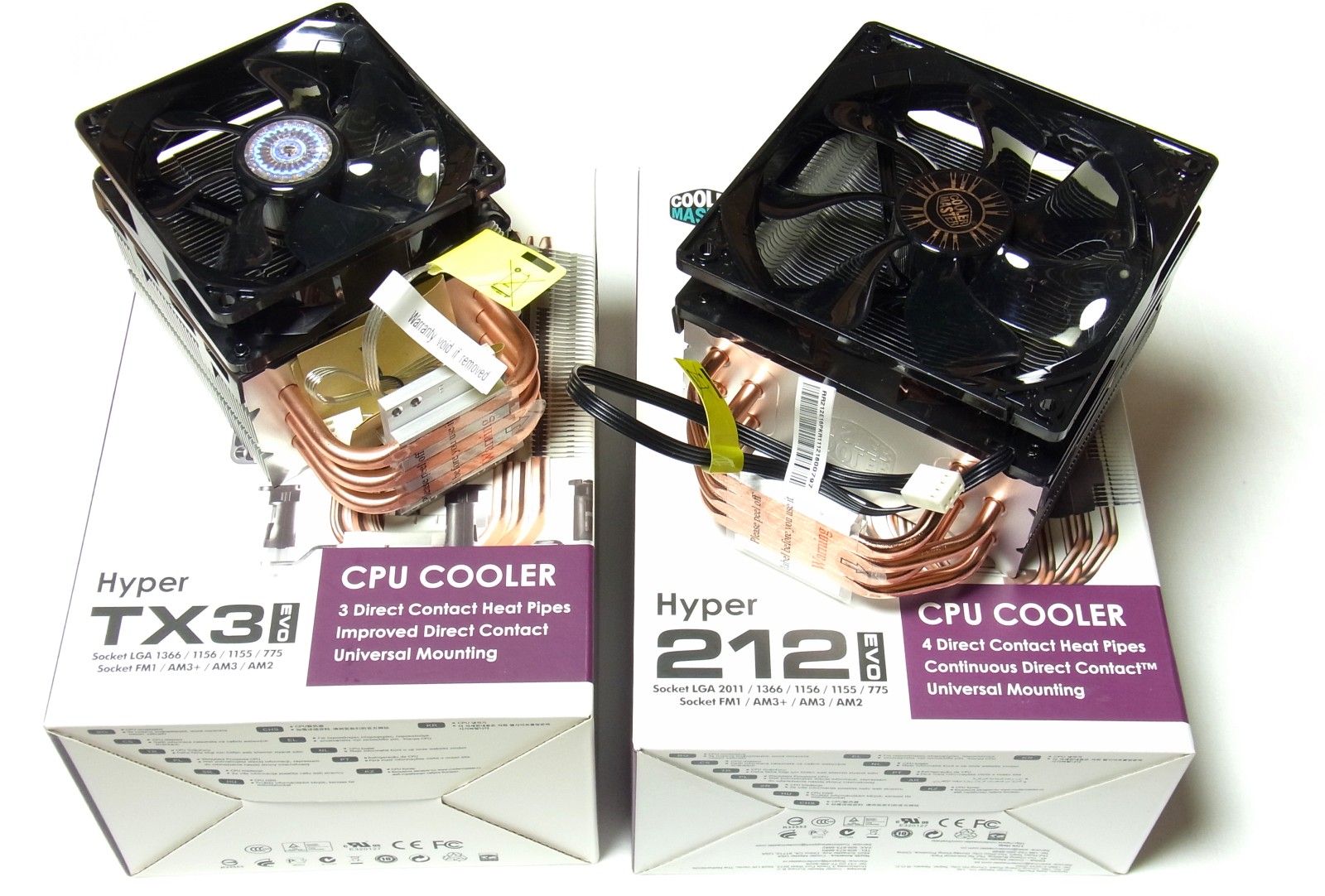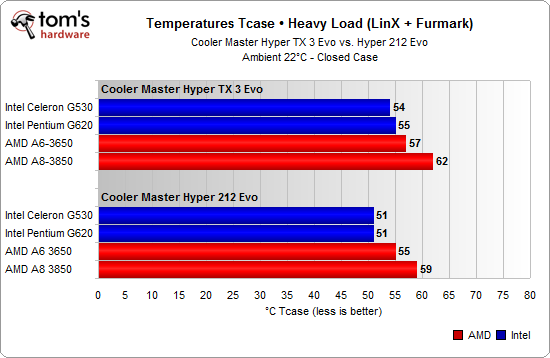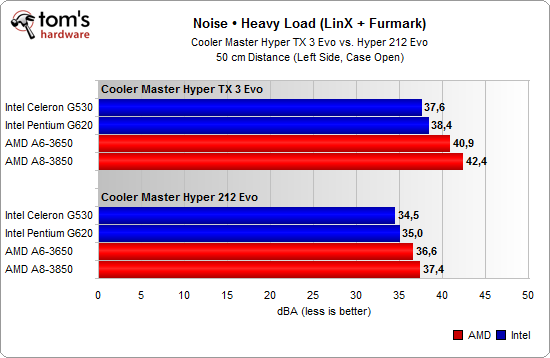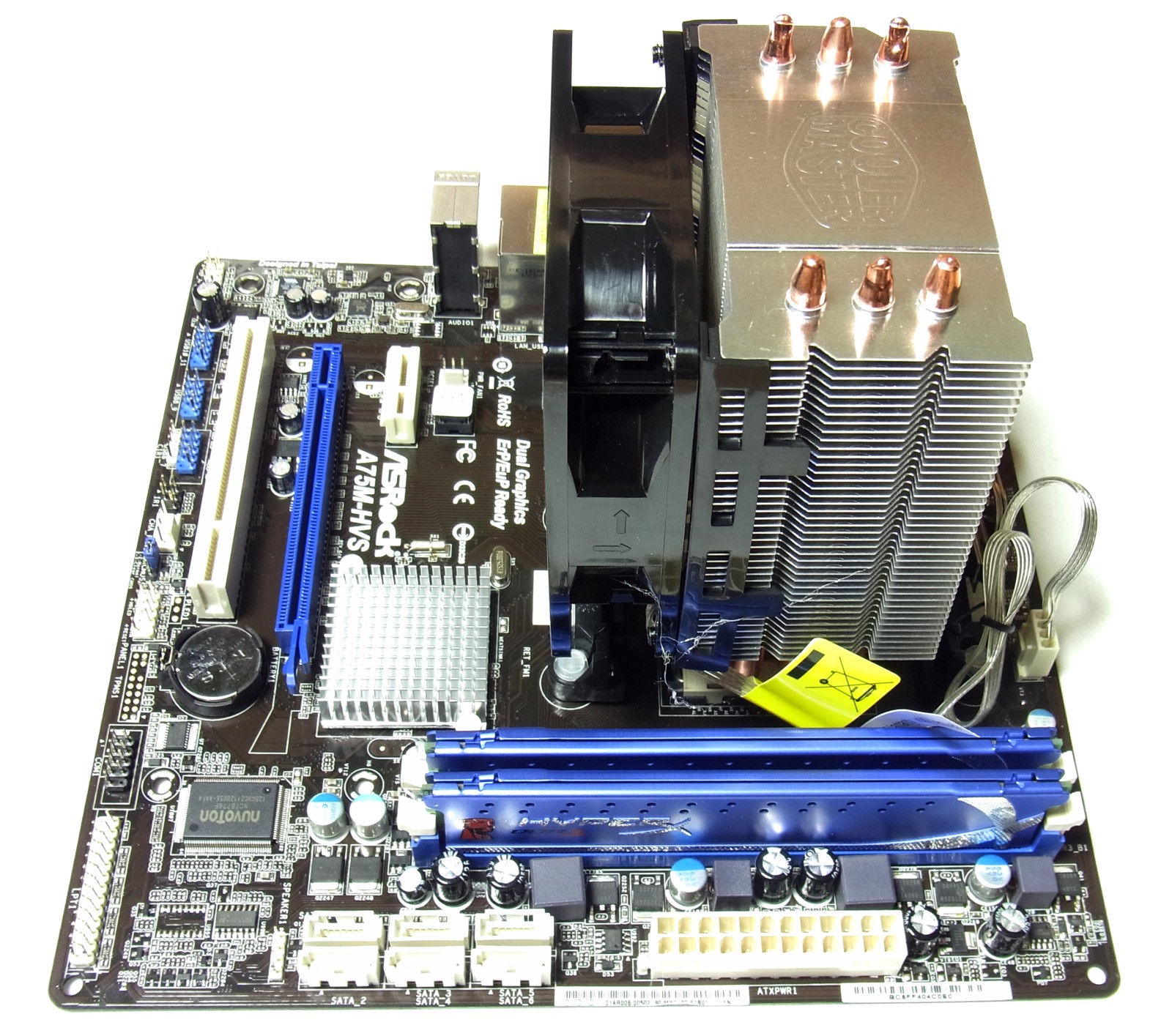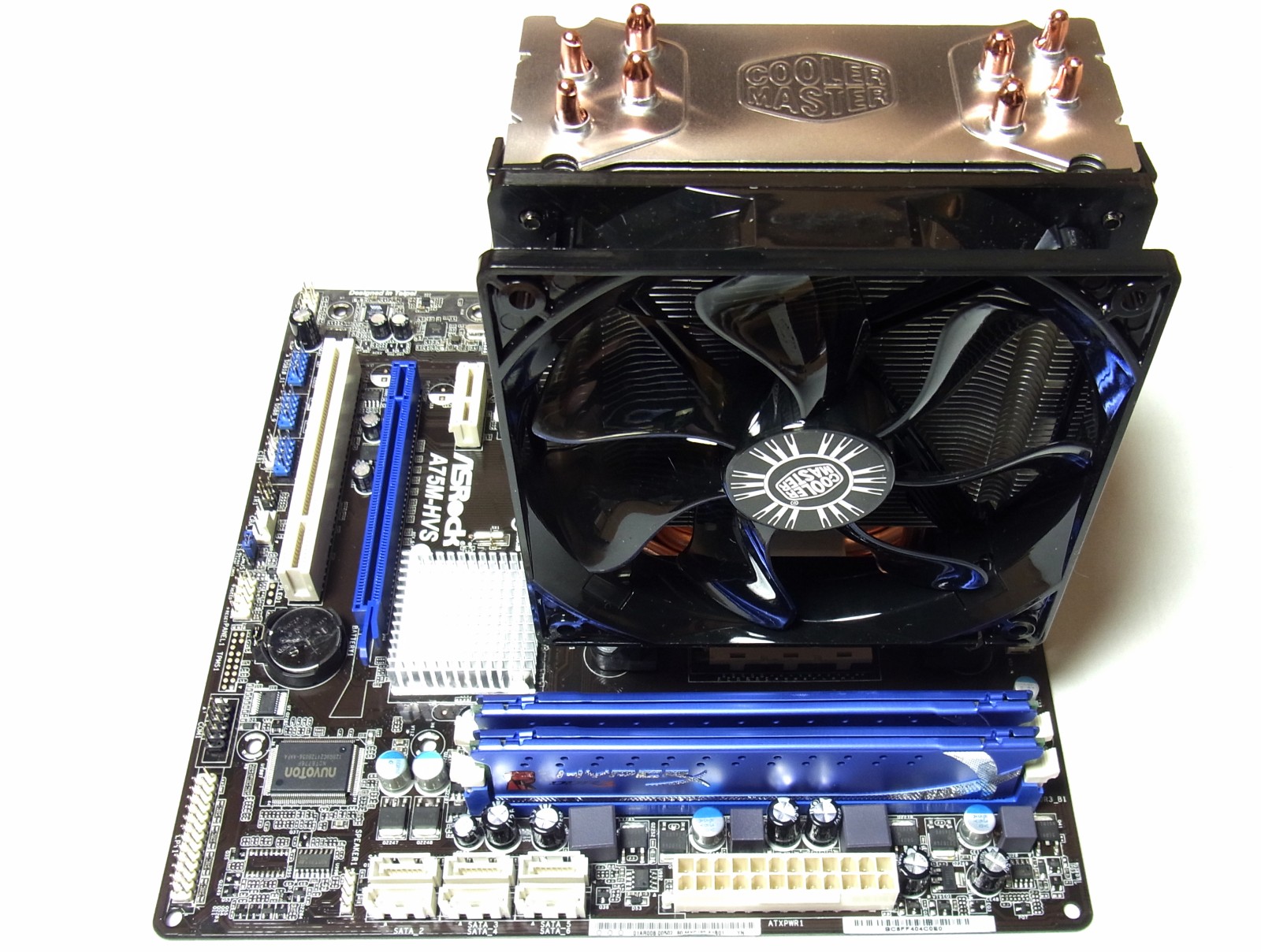Build It: Picking Parts For Your Kid's Entry-Level Gaming PC
Does your child always want to use your PC? Is it time to build him his own? If you don't trust the tier-one vendors to sell you a well-balanced machine, you'll be happy to know that you can piece together your own entry-level box for less than $450.
Cooling On A Low-End Budget
Bundled Thermal Solutions Don’t Cut It
Neither Intel’s nor AMD’s included CPU coolers are quiet or efficient. And both can run into major trouble if your ambient room temperature is too high, making it a hazard to open your windows in the summer. Consequently, we looked for CPU coolers that would operate a lot more effectively, while respecting our low-budget aspirations. We ended up choosing two Cooler Master-based solutions for testing.
These two models cost about $18 and $35, respectively. AMD's A8-3850 is most likely to run into trouble with a smaller heat sink, since it runs warmer than the other three CPUs. So, first, let's see if the larger cooler is necessary, or if we can get away with the smaller one.
Temperature and Noise Benchmarks
Surprisingly (and pleasantly, the smaller heat sink manages to cool all four processors adequately. It did reach its limits, though, so if you want to really emphasize conservative acoustics or turn your thermostat up to save money on the electricity bill, the larger cooler might be advisable.
Of course, while the thermal benchmarks are important, it's also critical that your heat sink of choice fits into the case you want to use. This can be a problem for AMD-based systems. If the original bracket is used to mount the CPU cooler on the motherboard, heated air is often blown toward the top of the case instead of the back. If you have a graphics card installed underneath and there's no ventilation up top, the resulting cooling setup will probably turn out to be sub-par.
| CPU/APU | Cooler Master Hyper TX 3 (Evo) | Cooler Master 212 Evo |
|---|---|---|
| AMD A8-3850 | Adequate | Good |
| AMD A6-3650 | Good | Good |
| Intel Pentium G620 | Good | Very Good |
| Intel Celeron G530 | Good | Very Good |
| Price | $18 | $35 |
Bottom Line
Get Tom's Hardware's best news and in-depth reviews, straight to your inbox.
The cheaper heat sink/fan combination manages to cool all four tested systems, including AMD’s 100 W-TDP APUs in a closed case. However, the larger, more expensive model buys you more headroom for higher temperatures and less noise. We’re calling this one a draw and recommending that you make your choice based on personal preference.
Now, for a look at system memory.
Current page: Cooling On A Low-End Budget
Prev Page Picking A Platform: Comparing Intel And AMD Next Page Memory Capacity And Data Rate
Igor Wallossek wrote a wide variety of hardware articles for Tom's Hardware, with a strong focus on technical analysis and in-depth reviews. His contributions have spanned a broad spectrum of PC components, including GPUs, CPUs, workstations, and PC builds. His insightful articles provide readers with detailed knowledge to make informed decisions in the ever-evolving tech landscape
-
velocityg4 Interesting, but I'm assuming most parents that build there own computers, game and read toms hardware would be better suited just giving their kids their old gaming PC's. Since many this enthusiastic will already be replacing them every couple of years. Now they have another excuse to replace them and their kids get computers made from former high end and quality parts that are still very fast and more than capable of playing any kids games and edutacational/edutainment software.Reply
Although I say just give them an Apple IIe so they can learn on what we learned on in school. -
s3anister velocityg4Interesting, but I'm assuming most parents that build there own computers, game and read toms hardware would be better suited just giving their kids their old gaming PC's.I see the reasoning in this, however, for someone like myself I found this an interesting article; as I'm actually about to build a computer for my nieces and they do not need a fully featured gaming rig. It doesn't make sense to give them a machine that doesn't suit their needs and I'm sure many other parents/uncles/aunts are in the same boat.Reply -
JOSHSKORN or at that age, you could just buy an Android tablet or an overpriced iCraplet. Both probably support AngryBirds or other games and you can take them along to trips, dinners, church and other events to shut them up.Reply -
Belardo JOSHSKORNor at that age, you could just buy an Android tablet or an overpriced iCraplet. Both probably support AngryBirds or other games and you can take them along to trips, dinners, church and other events to shut them up. So show me a top of the line Android tablet that costs less than the "overpriced" iPad...Reply
-
Maximus_Delta iCrap (something for the fashion victims & super creative types to show off whilst sipping their skinny lattes in starbucks whilst facebooking their friends about the fact that are in starbucks, having lattes, and got a new iPad / macbook)Reply -
Belardo What *YOU* do is hand your kid the OLD computer when you upgrade. But yeah, since about the age of 1 and a half, my son has had his own PC... keeps if off ours. He did damage his CRT monitor with paint - which was somewhat cleaned up. Fine. His first was a client's out-dated Pentium III-1Ghz which he paid $2500 when it was NEW. Then he got a compaq handme down from mom.Reply
Today, age 7: AMD X4 CPU, 4GB RAM, ATI 4670 card I built from various parts. I use it for background work since its so powerful. He does his educational and game software on it.
When I was age 7, the Apple II was just released and most people didn't know what one was. It wasn't until 1980 that we started seeing these $1200~3000 computers... usually in the school library with 1 or 2 units. My 1985 PC: 1-2Mhz 128k RAM, 360k floppy drive system with a monitor was $900+. I still have it and it works. I forgot how to use it.
Suggestions when building a PC for 3~8 year olds: buy a logitech notebook mouse ($15~20) as these are smaller but perfect for little hands. Use a cheap keyboard as kids tend to be messy and destroy them. if they are real young (1~3yrs old) try to get your hands on a CRT. Harder to knock over, costs $0~5 if you can find one.
Also, a $200~250 netbook makes a good "notebook" for young kids (4~9 years old). Or give your kid your old notebook. My kid was given a 17" notebook a friend gave away when he upgraded.
-
acerace Reply9534995 said:So show me a top of the line Android tablet that costs less than the "overpriced" iPad...
You're feeding the troll, genius. :heink: -
JohnnyLucky Leave out the bling and dedicated video card for a basic pc for grandma and grandpa! I've already built a couple for senior citizens who are not gamers.Reply
BTW - there is an option to dedicate some of the memory to the integrated graphics. I installed inexpensive 8GB memory and dedicated 2GB to the graphics. What I don't know is if it makes a real difference. Would that help gamers? -
amdfangirl JohnnyLuckyLeave out the bling and dedicated video card for a basic pc for grandma and grandpa! I've already built a couple for senior citizens who are not gamers. BTW - there is an option to dedicate some of the memory to the integrated graphics. I installed inexpensive 8GB memory and dedicated 2GB to the graphics. What I don't know is if it makes a real difference. Would that help gamers?More or less dependant on the speed of the RAM.Reply -
Proximon After all that build up a cheap PSU is used based entirely on claims written on the box. No reviews exist and apparently Cooler Master knows it's junk because they haven't bothered to get it certified by 80plus.Reply
